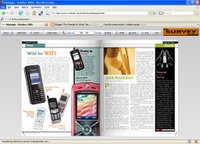In one of his latest posts,
Owning the Teaching...and Learning, Will Richardson laments the lack of buy-in teachers have regarding their own personal learning and their lack of desire "for exploring his or her own learning through the tools" of Web 2.0.
I do not see teachers doing this either. Professional learning is still centered on graduate classes, master's degrees and workshops they take through professional development providers. Why? To learn certainly, but to also move over and down in the salary schedule. Many teachers have no idea of the ability to develop a sophisticated network of teachers through the tools that many of us use every day. And if they did know about those tools-well, so what-I'm doing just fine, thank you.
My post,
Gap Analysis, on the Techlearning blog explored the
change required to develop personal learning in greater depth:
"But if you are a teacher, why change? Seriously! Why? Will you make more money? You are already grading papers, coaching sports, serving on committees, and chaperoning the freshman dance-you can’t do more.
And you really aren't that interested in doing things differently. Will you get more respect from your kids, your peers, your parents and your administrators if you do? Unlikely. The obvious answer is that the kids will learn in a new way and will probably be better prepared, but many teachers have been pretty successful for a number of years, so what does working harder with poorly understood tools and little support actually buy them? Would you change?"
As Will's title to his post suggests, it's about teaching and not about student learning. That's what's at the heart of all this. If it was about learning,
truly about learning, then the altrustic thing to do would be to change for the sake of the kids, because it would mean potentially everything to their education. I'm not just talking Web 2.0 tools, I'm talking about teaching them how to learn....
Will continues:
"But the litany of reasons why this can’t happen are on the tips of too many tongues."
I won't make many friends with this, but here are the excuses, the reasons, why most won't extend themselves-why they won't alter what they've always done-why they won't develop a learning network, and why they won't teach this to their kids. The excuses are presented by a hypothetical teacher giving thanks...
Thank you for standards that are content-based because I am a content expert, and none of the standards mention anything about Web 2.0 or a personal learning network.
Thank you for high-stakes testing, so that can be the focus, and take the pressure of using new learning technologies off of me.
Thank you for all the research that says technology does not make a difference in student learning (or in mine?).
Thank you for the administrator, who I can defer blame to for not providing the right climate, the right amount of time, and the right whatever else…
Thank you for my textbook and the support materials that come with it. It provides everything I need to know.
Thank you again for the administrator who does not value technology, does not understand technology, does not evaluate me on my application of technology to the learning process, and wouldn’t know an effective lesson that utilizes technology properly if it smacked them in the nose. They don't use Web 2.0 tools either.
And thanks again for that same administrator who stays in their office, oblivious to the kinds of instruction, and who only emerges when it is time to “evaluate” me.
Thank you for filters, because they block all these tools, so that I couldn’t get to them even if I wanted to, which I don’t.
Thank you for not having a process to request that a site be unblocked-how lucky can I be?
Thank you for making professional development optional.
Thank you for my file cabinet which contains everything I need, from now to retirement.
Thank you for my 6X5 grid and my lectern. Thank you for pencil and paper. Thank you for multiple choice tests that I can run through the scanner. Thank you for all the videos I can show on Friday.
Thank you for all the bad assessments I have to grade, which gives me an excuse not to move forward because I spend most of my life grading…
Thank you that there are only 24 hours in a day, because I don’t have the time for this.
Thank you for the technology coordinator who focuses on changing print cartridges rather than helping build proper lessons with technology.
Thank you for the librarian who dismisses tools like Wikipedia, and who will find Web sites for me so I don’t have to, and create a book cart that can be wheeled into my classroom in place of teaching kids how to locate information for themselves.
Thank you for refrigerators, so that my students will have a place to post their most creative and interesting pieces of work, at least for several days.
Thank you for technology that sometimes doesn’t work, so that I have another handy excuse.
Thank you for tenure. Thank you for valuing mediocrity or worse. Thank you for a job for life regardless of performance.
Thank you for the courage to give kids embarrassing and worthless assignments, like requiring kids to make a human cell made out of a jello mold (which is kept inside of the refrigerator rather than posted on it), which causes them to utter “Are you kidding me?” as soon as they are in the hallway.
Thank you for my community, who, after all the bad press surrounding social software tools, lives in a culture of fear.
You might think that I am teacher bashing here, but I'm not-I've managed to offend everyone. Look at the excuses-it's not hard to understand why this is not getting done.
Blame is everywhere...














